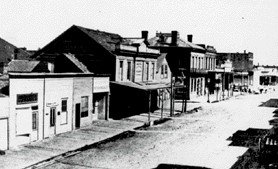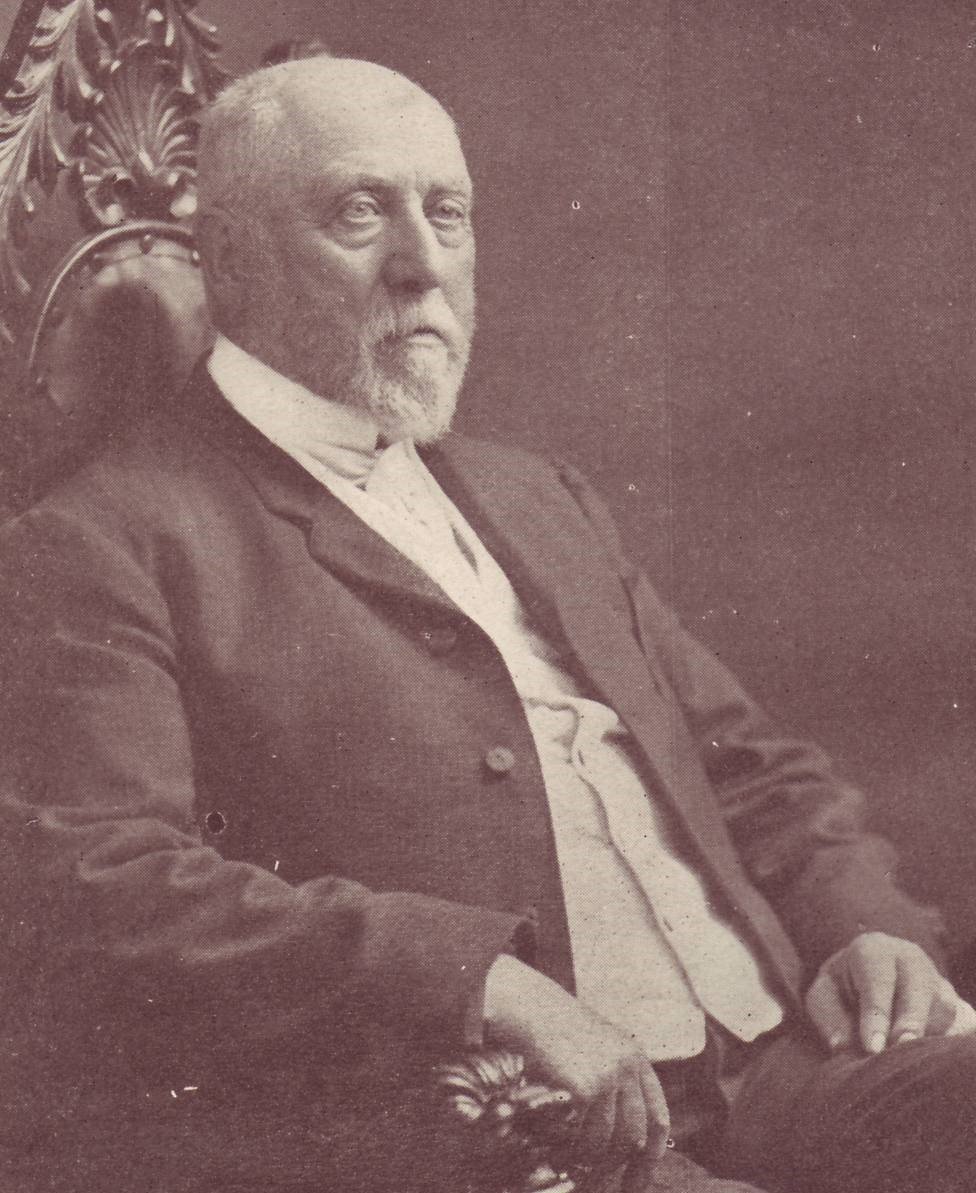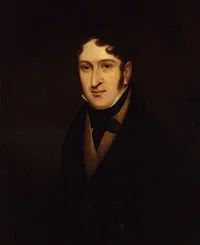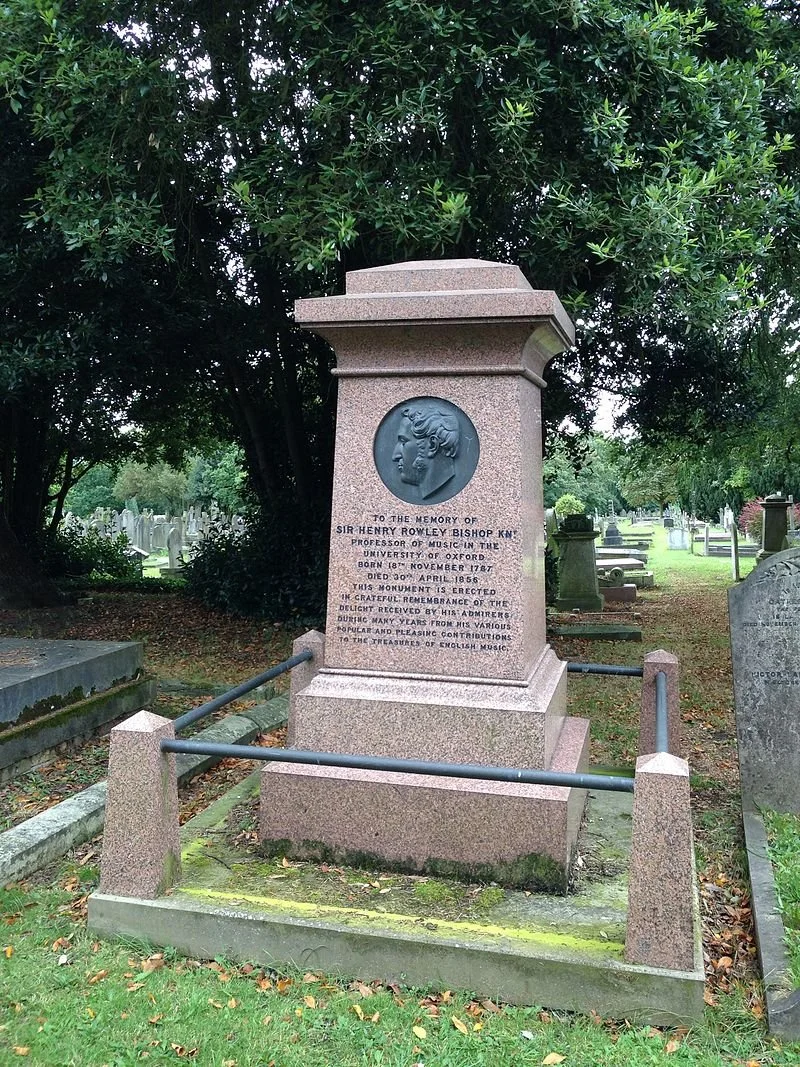Madame Anna Sang With a Broken Heart
Men wept unashamedly, women swooned and young gentleman about town through kisses and flowers when Madame Anna Bishop, the toast of three continents, sang.
With her wistful Home Sweet Home, the heart-rending My Bud in Heaven, and the carefree Dashing White Sergeant, Madame Anna captivated thousands from London to Melbourne to San Francisco for half a century. Honours, fortune—and tragedy—formed the remarkable career of this remarkable lady—a true prima donna.
The Victoria Theatre, later the Theatre Royal, is the unimposing building mid-photo. By all accounts, it was much more luxurious inside. —BC Archives
When, finally, the famous lady of the song visited Victoria in 1873, the old Theatre Royal was packed for 10 glittering nights. Ironically, few of her enthusiastic audiences could have realized that anything was amiss, that the great Madame Anna faced them with a broken heart.
Pioneer journalist D.W. Higgins recalled how Mme. Anna Bishop, then Europe’s leading soprano, came face to face with her tragic past in outpost Victoria. —Author’s Collection
Her beautiful voice never faltered, her features never for an instant betrayed her secret—that Victoria meant the heartbreak of a lifetime.
But for the alert eye of David W. Higgins, the pioneer journalist we’ve met in several previous Chronicles, her secret might have passed unrecorded. Not until long after her death did Mr. Higgins tell her sad story as one of a series of reminiscences he wrote for the Victoria Colonist and in two books.
Thirty-six years before her haunted appearance in Victoria. in the month of December, 1837, he began, “Musical circles of London were excited by the announcement that a new star of the first magnitude had been discovered in the musical firmament and that it was about to dazzle the public eye with beauty and grace and more rare accomplishment as a vocalist.
“It was given out that the lady was very young; that she was a favourite pupil of Mr. (afterwards Sir) Henry Bishop, the famed composer, and that under his auspices and tutelage she would appear. The place selected for the debut of the talented young lady was Covent Garden Theatre, and when the evening arrived the reader may be sure that the building was thronged by an eager and expectant audience. All the curled darlings, the gilded youths and the belles of London society were there.
“Royalty, no doubt, honoured the performance with its presence and the brilliant scintillation from a thousand gas jets, the display of rich and lovely gowns, and the glitter of costly diamonds must have captivated the senses and dazzled the eyes of those who were so fortunate as to gain admittance.
“The new prima donna had scarcely sung a dozen lines of the score before the audience was entranced, and as a sweet notes died away and the timid, trembling debutante, all aglow with pleasure and excitement and a sense that she had achieved a great triumph, advanced to receive the ovation of the vast assemblage of men and women [who] rose their feet, waved their handkerchiefs and cheered in approval, while bouquets composed of the choicest flowers rained about her from all parts of the house.”
Mme.Anna Bishop in later years. —www.pinterest.com
The lovely singer was an instant success, “her animated style, her sweet and youthful face and her bashful manner, combined with her musical power and range,” making her a national idol. Men with titles threw themselves at her feet, the doors of the best society were thrust open, "audiences showered her with applause and bouquets. One enthusiastic crowd even unhitched her team and pulled her carriage all the way home from the theatre.”
But all would-be suitors met with defeat, for Anna's heart had been won by her tutor, Henry Bishop. Although 30 years her senior and “by no means a handsome man...noted for his irritability and extravagant habits," the famous composer had courted and conquered his quote young and impressionable protege.
Composer and mentor Henry Rowley Bishop swept the rising young star off her feet. —Wikipedia
Throughout England, eligible bachelor's mourned her unlikely choice. Few considered the match a “love one,” and all predicted disaster. Almost inevitably, they were to prove prophetic.
The newlyweds’ troubles began soon after the ceremony. Bishop was “set in the ways and habits he had acquired while leading a butterfly existence. His wife, who was young, ardent and impulsive, had no idea of adapting herself to the tastes of her husband. She liked young company, while Mr. Bishop's tastes led him into older society. His wife had views and aspirations with which he had no sympathy."
In due course, Mme. Bishop gave birth to a daughter, and “for a time the joys of motherhood and absorbed” her attention. But not for long. Even knighthood had failed to slow her reckless husband, who, between compositions and teaching at the University of Edinburgh, squandered the large fortune she’d earned on the stage.
More years passed “in inharmony," continued Mr Higgins, “when there joined the company of which Lady Bishop was the prima donna an elderly Hungarian harpist name Bocksha (I am not sure that this name is correctly spelled, but it was pronounced Boxer). The two were thrown much together. Bocksha was older than Bishop.
“He was at least 60 years of age. His long white hair brushed from his forehead fell in graceful folds upon his shoulders and imparted a picturesque and classical appearance to his intellectual features. He was the greatest performer on the harp of his day—perhaps the best."
Finally came the day when London society was “shaken to [its] foundations” by the news Lady Bishop and Bocksha had vanished. When days passed without sign of the missing couple, there were hints of foul play. Suicide, said some. Weeks later, the truth swept both continents: Mme. Anna Bishop, as she now called herself, and Bocksha had fled to New York, formed an opera company and were touring the East.
Despite—or perhaps because of—the international scandal, the company was “well received and made much money. " Several years passed, the Bishop troupe touring as far as California and Mme. Bishop's fame grew steadily. In London, Sir Henry at last abandoned his wilder pursuits and devoted himself to music and his young daughter.
In 1854, Bocksha died in St. Louis. A year later, Sir Henry died in England. During a second visit to San Francisco, Mme. Bishop met and married a prosperous auctioneer named Schultz, “a bright and pleasant little man and a general favourite quote in the Bay City,” as Higgins put it.
Mme. Bishop was eager for new conquests but their voyage from Honolulu to Hong Kong became a disaster when their ship struck a reef. Passengers and crew, many of the women wearing nothing but nightgowns, had just time enough to lower the boats.
The captain and as many as a dozen of the ship’s company were never seen again but the Schultz lifeboat made it to shore and safety. Upon reaching Melbourne, they were destitute and almost naked. Gone were Mme. Bishop's expensive Paris gowns and 6,000 pounds’ sterling worth of jewellery. Her renowned voice came to the rescue and after a few concerts they were “on their financial feet once more”.
This accomplished, they sailed for England to satisfy a years-long desire by Mme. Bishop to find her daughter.
She learned Sir Henry had died destitute, having spent his own fortune and hers. But of her daughter, now a young woman, she was able to learn only that she’d married a man named Blackford and had emigrated to Australia.
Sir Henry Bishop may have died penniless but he was highly respected, as evidenced by his headstone in East Finchley Cemetery which had to have been paid for by his friends. —By No Swan So Fine - Own work, CC BY-SA 4.0, https://commons.wikimedia.org/w/index.php?curid=52368011
Disheartened, the singer returned to America for another successful tour of major cities before reaching San Francisco in 1869. After concerts throughout California and Oregon, she arrived in Victoria, where Mr. Higgins met the feted star.
“She was indeed a most agreeable woman,” he recalled. “No longer young, she still bore the marks of great beauty, her manners were gracious and courtly and all who met her carried away the impression that Mme. Anna Bishop was a perfect lady who had been deceived and wronged into marriage and who finally fled to avoid the persecution and rapacity of her husband [Henry].”
Although in her mid-50s, her voice “was sweet and full and showed but a few signs of wear. Her renditions of Last Rose and Home Sweet Home, and Suwannee River were marvellous. The audience demanded repetition after repetition and when the last note died away and the curtain fell, many retained their seats and cheered for some minutes in the vain hope that the diva would sing once more."
It so happened that there was a popular couple of Victoria society named Blackford. By a quirk of fate it was Mme. Bishop's daughter and her husband who’d come to the colony from Australia as a member of Governor Arthur Kennedy’s staff. Their consternation upon learning that the mother of Mrs. Blackford was in Victoria “was great [and] it was first intended that the family should cross the Sound, and stay there while the singer remained here.
“But it was finally resolved to stay in Victoria.”
Somehow, word of Mrs. Blackford's identity leaked out. Within hours, one of the bolder gossips had informed Mme. Bishop. Higgins: "The Madam listened to the information with a face of stone. Not a muscle moved, not [an eyelid] quivered when she was told that her long-lost daughter was within reach. She asked no questions, thanked the lady with that grace and ease for which she was distinguished and did not refer to the matter again.”
That same evening, she thrilled the overflowing audience as she had so many times before. And again, each following performance, without betraying the slightest evidence of emotion.
Then it was the last night. Theatre Royal was "overcrowded,” but the box usually occupied by the Blackfords was empty. At last the curtain fell, to a standing ovation, the engagement was completed, and Madam Bishop returned to her luxurious suite in the St. George's Hotel.
Minutes later, “a heavily veiled woman left the hotel, hailed a cab and ordered the driver to an address on Michigan Street where, upon arrival, she asked him to wait as she approached the house and “agitated the knocker timidly”. Moments later, a man answered.
From the street, the driver watched, fascinated. The man and woman conversed for some minutes when the visitor dramatically threw back her veil, to reveal herself as Mme. Bishop. The man didn’t appear to recognize her although he gave no sign of surprise at being visited at midnight by the famous singer.
When he moved to close the door, she burst into tears.
Touched, Blackford relented. They talked some more when until Blackford again moved to shut the door with his hip. When the singer, now almost hysterical, threw herself bodily into the doorway, an angered Blackford pushed her outside and slammed and bolted the door.
As Higgins tells us, Mme. Bishop “tottered down the steps, and almost fell on the gravelled walk. She clutched the railing to save herself and, resting her poor old head on her arms, sobbed as if her overladen heart would burst." When the cab driver hastened to her side, she moaned, "Oh, for but one look at my bonnie's face—the bonnie that I nursed in her infancy, that I have pressed to my heart and blessed in her sleeping and in her waking moments.
“Indeed, indeed, it is not my fault that I left her. I was driven away by ill-treatment. She is in there—there where the light shines behind the curtain. I must, I will see her. Come, driver, help me burst in the door!”
Restraining his hysterical fare, the nervous cabby finally convinced her that she should return to her hotel. The following day, Mme. Bishop “appeared on the street... as self-possessed as ever and never referred to the incident or to her daughter again”.
Then the music company continued its tour, sailing for New Westminster. Four years later, the great lady returned to Victoria for a 10-night engagement. Once again she “spellbound” society, despite the fact, as Mr. Higgins recounted 30 years after, "her voice showed signs of failing”.
“She went from here to England, she sang in cheap theatres, and at her final appearance in 1884 she was greeted with catcalls and vegetables from the gallery and was driven from the stage. Of all the brilliant throng who in 1837 went mad over the beautiful girl and her sweet notes there were none to do her reverence or protect her from insult.
“She had become a sport and guy [sic] for the rough elements that frequent low places of amusement, and the sun had gone down forever on her fame. Such is life!”
Retiring from the stage at last, Mme. Bishop (then living in New York) gave music lessons and died in 1888, a " gifted and much misunderstood woman, feeble and old and worn out.... in a foreign land".
Mme. Anna Bishop Schultz’s sunken grave and broken headstone in the St. Paul’s Lutheran Church cemetery, Red Hook, New York. The standing stone is that of her son, Augustus Schultz. —Rhineback Historical Society
What became of Mr. and Mrs. Blackford (if that was, in fact, their correct name as he often masked identities), Mr. Higgins didn't say.
* * * * *
Such is the sad tale of Mme. Anna Bishop’s visit to colonial Victoria, as told by D.W. Higgins. Where did he get the melodramatic details of her visit to the ‘Blackford’ house on Michigan Street? From the hack driver? We can only guess; Higgins was a newsman, after all.
His biographical account of the diva’s marriage to Henry Bishop, her elopement with harpist ‘Bocksha’ can be challenged as all parties involved have been adequately recorded. Briefly: Anna was 21, Bishop 24 years her senior when they married and they had three children. Her running off with harpist and conductor Nicholas Bochsa, 21 years older than she, became a years-long scandal of three continents.
She and Bochsa befriended American businessman Martin Schultz during a voyage from San Francisco to Australia. After Bochsa’s death in 1856, Schultz became her business manager then her husband and both survived the sinking of the Libelle while en route from Honolulu to Hong Kong.
Upon her death after years spent as a much respected piano teacher in Greenwich Village, N.Y., Anna was buried beside her son Augustus H.E. Bishop who’d died at the age of 39.
Originally unmarked, her stone was later inscribed, “Sacred to the memory of...Lady Bishop Schultz.” This is thought to be the only time her title was used in deference to her estranged husband (whom she’d never divorced), Sir Henry Bishop.
In a final, ironic touch to the Bishop-Bochsa-Schultz saga, Martin Schultz lost his fortune, died destitute in 1893 and was buried in a pauper’s grave.
* * * * *
Footnote: For 20-plus years the Victoria/Theatre Royal at the southwest corner of Government and View streets was the hub of Victoria social life until it was demolished in 1882 for the new Colonist Building. The owner of the Colonist? Our good friend and informant D.W. Higgins.







